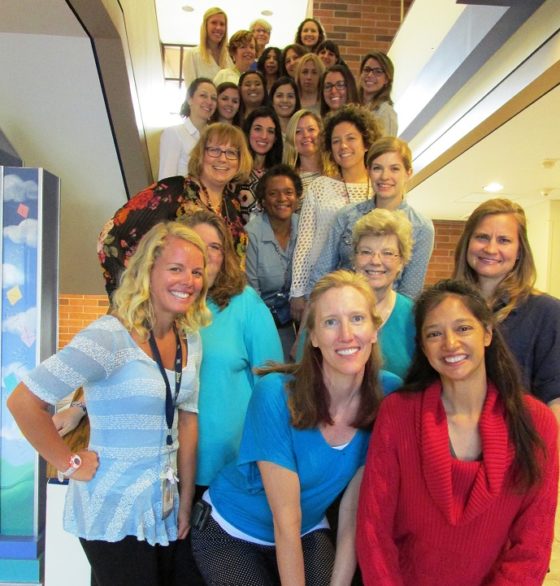Each year, the Cochlear Implant Program team from the Audiology and Speech-Language Pathology Departments (latter team pictured) at Rady Children’s Hospital-San Diego witnesses dozens of profoundly deaf or severely hard-of-hearing children experience the sounds of the world around them for the first time. Being outfitted with a cochlear implant, a surgically placed electronic device, can be transformative for a child’s development and future. But it’s not a one-and-done event — because recipients haven’t always been able to have the same speech-teaching interactions that hearing children do, life with a new cochlear implant can involve significant, specialized speech therapy requiring weekly visits. Accordingly, one of the key questions when evaluating a child as a cochlear implant candidate is whether or not they’ll be able to attend these visits, explains Shari Garrett, M.S., C.C.C.-S.L.P., C.H.T.P., manager of the Speech-Language Pathology Department.
With many of the Hospital’s cochlear implant families living in out-of-town areas such as Calexico, El Centro and Riverside County, Garrett says that can be tough. Until recently, speech pathologists saw families so dedicated to their child’s care that they’d spend hours each week driving back and forth to appointments, only to arrive (understandably) exhausted and less engaged than they would be with a shorter commute. She and her team knew something needed to change — they needed to bring speech therapy to families’ homes through telemedicine, a burgeoning form of health care that connects patients and providers from anywhere using audio and video technology. Think of it like a patient privacy-friendly version of Skype.
For Garrett, a natural starting point was California Children’s Services (CCS), a state program that supports care for kids with a variety of health needs. While CCS traditionally provides speech therapy after hearing loss and cochlear implant surgery, coverage had guidelines stating that speech-language pathologists were not approved telemedicine providers, and that telemedicine care could only be carried out if patients came to CCS-licensed facilities for their sessions. So, Garrett proposed the Rady Children’s department be permitted to pilot telemedicine speech therapy using Zoom, a secure, privacy-compliant platform the Hospital uses for other telemedicine initiatives, as a starting point. CCS agreed to a small patient pilot, which was carried out at a facility in south Riverside County as a provider had to be present. All patients responded well and made good progress, particularly one child who has a love for all things computers and quickly became more connected with his sessions. With CCS on board, Rady Children’s also partnered with CCS centers and speech pathology centers across California to broaden the reach of the trial and include delivery of service within patients’ homes.
With the pilot a success, it was time to make things official on a state policy level, and in summer 2018, CCS made speech-language pathologists approved telemedicine providers. It also authorized therapy to be conducted in families’ homes and re-designated telemedicine-based speech therapy from under the umbrella term of “telehealth” to “telespeech.” The latter included CCS updating its guidelines with help from Rady Children’s, citing the Hospital’s “most thorough and comprehensive telemedicine policy” as a strong model. The innovations even had to be confirmed in the California State Legislature this past fall!
Garrett states the most exciting and rewarding thing about bringing speech therapy into patient homes is the fact Rady Children’s — and many other facilities across the state — can now break down barriers to care for patients who previously would have been denied for cochlear implants, or whose families would have had to make sacrifices to travel for their therapies. “This really opens and broadens our abilities,” she says, noting that some kids have been able to qualify for cochlear implantation solely because of telespeech offerings — before, they didn’t live close enough to care locations. In addition, although the process will take some time to sort out, Garrett anticipates the updates will open doors for private insurers to cover telespeech services.
Just a couple of months into the official program, Rady Children’s cares for 12 patients via telespeech and is focused on expanding. Although one monthly visit is required —“we want to make sure what we’re seeing over the computer is matching with the child’s in-person interactions,” explains Garrett — it’s already making a difference in the lives of families who once had to travel for five or more hours per appointment. Garrett notes that for children who live nearby Rady Children’s locations, maintaining their personal visits is still optimal and standard procedure, but that telespeech could potentially be an option for the occasional sick day down the line. “Increasing access [to kids who live far away or in underserved areas] is the number-one priority,” she says.
